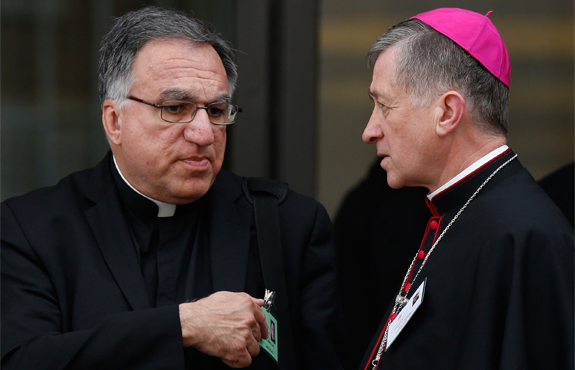

Chicago Archbishop Blase Cupich is not a heretic. Although that adjective is being tossed his way with some frequency these days, there is no evidence that Cupich doubts or denies some doctrine that must be believed with divine and Catholic faith (1983 CIC 751) and so he is not, as far as I can see, a heretic.
But if Cupich really has, as reported here, doubled down on his earlier intimations that, among others, divorced-and-remarried Catholics and Catholics living in ‘same-sex marriages’ should, and must be allowed to, ‘follow their conscience’ even if their conscience leads them to the proverbial communion rail, then he is misrepresenting Church teaching on marriage—which holds marriage to be a permanent union between aman and a woman (1983 CIC 1055, 1056)—and is failing to urge the observance of all ecclesiastical laws (1983 CIC 392), among which laws two are especially relevant in approaching for, and being given, holy Communion, namely, Canons 915 and 916.
As has been explained many, many, many times, Canon 916 impacts the individual considering approaching for holy Communion and directs those “conscious of grave sin” to refrain from approaching for the Sacrament. Individuals must form their consciences in accord with Church teaching and, yes, Cupich alludes to “Church teaching” in underscoring the fundamentality of conscience, but he fails, I fear, to point out, among other things, that conscience is used largely to assess whether one’s concrete action in a given situation accords with Church teaching—not to determine whether one agrees with or accepts Church teaching in the first place.
Canon 915, however, in contrast with Canon 916, directs ministers of holy Communion to withhold the Sacrament, not from “sinners” per se(as if ministers could read souls!), but rather, from those who “obstinately persevere in manifest grave sin”. Now there is zero doubt but that, in Catholic tradition, attempting marriage following a civil divorce and/or entering a “same-sex marriage” is to undertake the kind of gravely wrong public action that triggers ministerial obligations under Canon 915. Thus, when Cupich (and he is not alone in talking this way) says “It’s not up to any minister who is distributing the Eucharist to make a decision about a person’s worthiness or lack of worthiness” he misses the point: a minister is not assessing personal “worthiness” when withholding holy Communion from one’s whose conduct is described in Canon 915, but rather, is acting in accord with an age-old sacramental discipline designed to protect both the Sacrament from the risk of possible sacrilege and the faith community from the harm of classical scandal caused by someone’s public contrarian conduct.
Finally, recognizing the sharp differences between Canon 916 (impacting individuals) and Canon 915 (impacting ministers) allows us to make one last point: amid all the discussion of the primacy of conscience it seems almost forgotten that clergy have consciences, too. Many clerics, Deo gratias, and other ministers of the Eucharist, recognize the significance of their sacramental office and know—as all Catholics should know—that their actions, too, are carried out before a God who sees all. These ministers understand Church doctrine and discipline on marriage, Communion, conscience, and liturgical office, and they wish to act in accord with those teachings and laws, even in the face of growing pressure to disregard these considerations and despite the lack of support some experience from Church leadership.
Their consciences, too, I suggest, deserve respect.
(This essay originally appeared on the In the Light of the Law blog and is reprinted here by kind permission of Dr. Edward Peters.)
If you value the news and views Catholic World Report provides, please consider donating to support our efforts. Your contribution will help us continue to make CWR available to all readers worldwide for free, without a subscription. Thank you for your generosity!
Click here for more information on donating to CWR. Click here to sign up for our newsletter.


